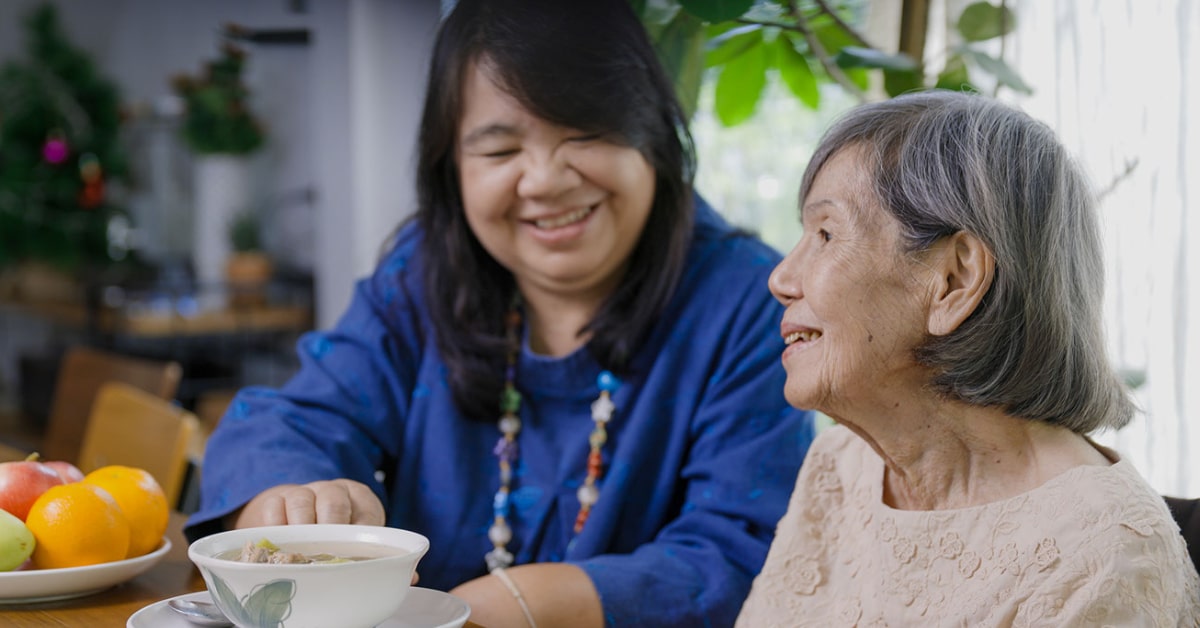
Caregiver for family member in California: Caring for elderly in your home
November is National Family Caregivers Month (NFCM). It began in 1997 to set aside time to recognize and honor those who care for family members throughout the country. Over 65 million caregivers in the United States care for loved ones who cannot care for themselves.
This unpaid position and duty that comes from love provides care for about ninety percent of aging or disabled in our country.
Becoming a carer for a family member can be a sudden and stressful experience. Perhaps your family member has had a heart attack or stroke, calling you in to help at a moment's notice. A new diagnosis can also trigger the need for home care by a family member.
Even gradual changes in health can lead to sudden caregiving responsibilities. It can be a challenge to recognize how dementia is progressing. One month your loved one may seem fine, and the next month you wonder why you didn't notice such a sharp decline. It is more difficult to see subtle changes that add up if you live farther away and only see them on special occasions.
Talking on the phone can let you know some things, but others may be hidden and require an in-person visit to recognize them. You may unexpectedly become the carer for a family member when gradual changes add up and reach a tipping point and you find yourself caring for elderly in your home.
Please use this month to show your appreciation and learn about caregiving and the issues caregivers face. If someone in your family receives home care by a family member, brainstorm ways to support the carer better. When you care for a family member, you often forget to care for yourself.
Becoming a carer for family members can be overwhelming. It can cause marital issues that may require relationship counseling to resolve. There can be a steep learning curve to figuring out a routine that works for everyone in the household.
Caregiving is a draining and all-consuming undertaking. It can take over your life and leave you feeling exhausted, isolated, and lonely. A few hours of respite can mean the world to a full-time caregiver. Another supportive action is to keep an eye out for signs of caregiver stress.
You will be a part of caregiving sometime in your life if you haven't already. You may find yourself caring for an elderly family member, making caregiving decisions for a family member, caregiving for a spouse or partner, or close friend, or needing care yourself.
If you are a caregiver for family member in California, you can receive online support either individually or with family members.

Caregiver Support: Providing resources for the carer for a family member, California
Caregivers need more support. They often put their lives on hold to provide the care their loved one needs. Other family members usually have no idea what it is like to give the level of care their loved one requires. Caregiving can be all-consuming if you don't have a solid support system.
Many of my clients have complained about how family members treat them. While caregiving for your parents, family conflicts can arise. When caring for elderly in your home, you must make many changes.
Being the primary carer for a family member not only creates a significant difference in daily routine, but there are also often physical changes to make as well. You may need ramps installed, doorways widened, furniture moved, and other modifications to facilitate care. It helps if family members acknowledge the changes and the impact of caring for an elderly parent.
It is common for caregivers who care for a family member to move into the parent's home to provide a familiar setting where their parent feels comfortable. Caring for the elderly in their home requires the carer to give up their own home. Hurtful feelings and accusations can result when family members see them as having free rent instead of recognizing how much work they do and the personal life they gave up.
Some caregivers develop trauma symptoms from family discourse. It's a good idea to keep an eye out for signs of caregiver stress. Caregiving for your parents is a stressful undertaking.
Becoming a carer for family member and providing home care can be physically taxing and exhausting. Many caregivers develop chronic pain. As a primary caregiver, you may experience emotional distress. Watching your loved one struggle and helping them maintain as much dignity as possible is emotionally draining.
Caring for an elderly parent can bring up childhood emotions. Fatigue and depression are also common. Caring for the elderly in their home can bring up feelings of loss of privacy, personal belongings, and the comfort of having your own home.
You may find that you spend so much time caregiving that you have no time or energy to care for yourself. Caring for elderly in your home directly impacts every part of your life. You are constantly thinking about what needs to be done next.
Your responsibilities span from making appointments and picking up medication to bathing and dressing. The amount of time it takes to get your loved one ready to go somewhere can be staggering.
It can be difficult to keep up with day-to-day responsibilities like housework and laundry. Your sleep is often disturbed several times a night. Caring for elderly in your home is a 24-hour-a-day, seven-days-a-week commitment.
Unfortunately, this is not an uncommon story.
Caregivers who care for a family member across the country from family support are barely making it through each day, struggling to provide quality, loving care and interaction. The heavy burden of caregiving often leads to caregiver stress and burnout.
Home care by a family member triggers the need for extra support to maintain physical and mental health. If you want to support a carer for a family member, California online counseling is a good place to start.

Signs of caregiver stress when you care for a family member
Your family's primary caregiver may be so focused on caregiving for your parents or loved one that they don't notice how neglecting self-care impacts their health and well-being. They could be heading toward burnout.
Being a caregiver for family member in California can be more difficult than in other areas. There can be a lot of traffic to contend with to get to appointments. Different types of medical care can be so spread out, you may have to travel far to get to medical specialists. The added stress can be monumental.
It can be difficult to notice changes in your mental and physical health when you are focused on caring for someone else. If you or a family member is caring for an elderly parent or another family member in need of care, here are some signs of caregiver stress to let you know when there's a need for more support and time to recharge:
- Low on energy most of the time
- Being too busy to answer the phone during the day or resort to sending messages to reply in the wee hours of the night
- Lack of a social life due to logistics and fatigue
- Persistent fatigue
- Not eating healthy meals or snacking to survive
- Wight changes
- Lack of exercise
- Sleep issues
- Persistent worry
- Easily irritated
- Losing their spark and enjoyment of life
- Hopelessness
- Dropping hobbies they once enjoyed
- Physical and emotional needs not being met
- Lack of patience
- Quick to argue
- Easily exasperated
- Set off by "little things"
- Physical issues - pain, headaches, stomach/ digestive issues, muscle weakness, getting sick easily (weak immune system)
- Lack of flexibility
- Fear of losing your loved one
- Doubting their ability to provide care
- Talking about themself in a negative way
- Low Self-esteem or Self-worth
- Feeling sad or down
- Anxiety, Depression, or Mood swings
- Crying easily
- Under constant stress
The constant responsibility, demands, and stress of home care by a family member can lead to mental health issues and physical injuries. Support for the continuing high demand can help carers avoid physical and emotional problems.
Caregiving also has a financial toll. It can impact current and future financial stability. Many caregivers provide both caregiving and financial support for their loved ones chipping away at savings. They may also be giving up their career and and their future financial stability.
Close to half of caregivers that care for a family member are over the age of age 50. Many are caregiving for a spouse who is aging while they are also experiencing health issues.
There are many things you can do to help better manage your stress and improve your health and well-being. Anything that reduces the burden and stress of caregiving can help you avoid depression, anxiety, and burnout so you can continue to provide care and avoid using a nursing facility.
If you are a carer for a family member, California counseling online can support you and help you cope with your responsibilities and emotions.
Ways to prevent caregiver burnout
When you notice signs of caregiver stress that lead to caregiver burnout, it's time to make some changes and work on stress management and self-care.
Some caregivers can get some support working with a psychotherapist. However, the constant demands of caring for elderly in your home can make it difficult to meet in person with a therapist who understands the ins and outs of being a caregiver.
Teletherapy provides the flexibility needed to fit counseling into your busy caregiving schedule. You will still be able to keep an eye on your loved one while you get the support you need. You can meet with a licensed therapist from home. There is no need to add to your stress by dealing with traffic and parking. All you need is a private pace where you feel comfortable to participate in a psychotherapy session.
If you are looking for psychological and practical support for your carer for a family member, California therapy online can provide support without the need to leave home. Searching throughout the state of California for a therapist also expands your choices and makes it easier to find a licensed therapist with caregiving experience. Therapy is a good constant support a carer for a family member can lean on to maintain their mental health.

Why do caregivers become depressed?
Caregivers spend a significant part of every day providing care. Caring for elderly in your home is extremely time-consuming. The amount of time and energy caregiving requires makes it impossible to do much of anything else without support. Caregivers give up many aspects of their life they used to enjoy.
Carers add caregiving issues to their personal problems. They tend to have more employment problems than the general public. Their stress levels, mental and physical health problems are higher than average. They suffer from a lack of sleep and a high level of fatigue, making their daily tasks even more difficult.
When you are caring for elderly in your home, you have less time to enjoy hobbies and time with friends. Carers often feel isolated and left out of social engagements. They don't get invites because they would have to take the person they are caregiving for and care for their constant needs.
It's even more challenging to participate in family gatherings. Getting someone in poor health out of the house is much more complicated than leaving the house with an infant.
Unfortunately, in addition to all the added stress of caregiving, caregivers experience more family conflict than non-caregivers.
Caregivers caring for elderly parents can also experience signs of caregiver stress when their loved one is unwilling to accept the help they need. Every little thing is a project of gaining consent before meeting those needs.
It is an emotionally exhausting process that is done over and over with respect for autonomy. Over time, the caregiver can become frustrated and feel that the relationship is not reciprocal. It often isn't. When there's dementia in the mix, caregiving can be even more isolating.
Caregiving for a spouse can lead to depression due to the difficulty of watching your partner decline. Watching the person you have partnered with lose their abilities is difficult. The relationship you have depended on is slipping away, and all you can do is be there, take care of their needs, and show your love.
Watching your loved one's mental and physical abilities decline over time can significantly contribute to depression. Caring for elderly in your home is an act of love. It hurts to know your loved one is slipping away.
Caring for an elderly parent can bring up unresolved emotional issues due to dementia. Dealing with dementia and all the heartbreak it brings adds more to bring on depression. Caregiver support for dementia is vital to continue to provide care.
Seeing your loved one disappear into dementia-related symptoms and behavior is a common contributor to developing depression.
Caring for an elderly loved one with dementia is a high-alert responsibility. There are so many safety issues. They may get out of the house and wander down the street. They might decide to make a meal and turn on the stove.
Dealing with resistance, violence, or foul language that can come with dementia from someone you love is quite the challenge. It can cut deep emotionally.
All these things place daily roadblocks in the way of providing care. Caregiver support for dementia can help you refresh, so you have the energy to keep up with everything.
As dementia progresses, the chances of caregiver depression increases. Respite is the number one protector against depression. Without respite and continual support, depression and burnout are pretty much inevitable.
Caregivers for a child with chronic illness or disabilities can suffer from watching their child go through difficult situations. Parent caregivers have a different kind of burnout experience than those caring for elderly parents. They deal with caregiving's physical and emotional demands while juggling educational needs and family responsibilities.
Parent caregivers often feel guilty about not being able to do everything, which can lead to even more stress.
If you want to support a carer for a family member, California counseling online can offer the emotional support they need in a convenient online format. They can benefit from therapy without wasting time on travel.

The impact of burnout and how you can help
Burnout can have a lasting effect, not only on the caregiver but on family relationships. If you see any signs of caregiver stress, consider getting professional help to support healthy coping and healing. There are ways to prevent caregiver burnout and find solutions to help you manage stress and fatigue and improve overall well-being.
Caring for the elderly at home can lead to physical and emotional issues. Daily care like bathing, toileting, and transfers from bed and chairs take a toll on the caregiver's body. The emotional stress of handling the day-to-day needs and the emotional toll of watching someone you love cope with their issues weigh heavily on the heart. If dementia is involved, it adds to the stress.
When home care by a family member is necessary, it is important to think about the morale of the carer. Caregiver support for dementia can provide the emotional strength they need to keep going. Knowing someone else is on your team to back you up can provide peace of mind.
You can support your family member who is caregiving. Have a conversation with them to find out what they need most. Here are some ideas to get you started:
- Check-in regularly. Meeting in person is best, but a video chat, phone call, or text is also beneficial. They need a social connection.
- Encourage them to join a caregiver support group
- Really listen and let them know you understand how much they are giving and that their sacrifice is appreciated.
- Help them set up respite care. A day away can do wonders. Even an hour or two can be rejuvenating.
- Offer to help. If you live too far away to help yourself, hire someone to help.
- Give them a gift certificate for a massage or other relaxing activity.
- Send them a card with an appreciative note.
Anything that can provide a break, show appreciation or help reduce stress will make a difference. I had a client whose sister sent her favorite homemade cookies from across the country once a month. She looked forward to them and would eat them while they chatted together on the phone. Another client's sibling called at the end of each day to check in and chat.
Remember, it's the little things in life that make a difference. Ways to prevent caregiver burnout don't have to be grand overtures or expensive plans. Home care by a family member can be sustained when care is taken to provide recognition and support.
What do caregivers need the most?
The short answer is support. Emotional and physical support are the top two things most caregivers need. Caring for the elderly at home or having a chronically ill child takes an enormous amount of energy and time. Respite is a bit part of being able to keep going.
Physical support: help with the daily care regimen, housekeeping, errands, calling medical professionals and pharmacies, making home repairs, preparing meals, and taking over care for a few hours, a day, or a week to provide a needed break to rest, recharge and have some fun.
Emotional support: All caregivers need emotional support to cope with all the ins and outs, ups and downs of caregiving. It is a very demanding responsibility. Emotional support can help them deal with the fatigue and stress of juggling so many tasks and responsibilities.
These ways to prevent caregiver burnout can go a long way to making home care by a family member possible. Support can making days run more smoothly and can also help preserve family relationships.

Therapy for caregiver burnout: Counseling for caregiver stress
I offer individual, couples, and family therapy for caregivers. We can find solutions for the situations you are facing and plan for the future. Some of the common topics we cover are:
- Balancing and sharing caregiving responsibilities
- Helping family understand the day-to-day challenges
- Find ways to manage loneliness, anxiety, and depression
- Remembering the rewarding and joyful moments
- Delegating
- Processing anger and grudges
- Respite planning
- Discussing caregiver roles and responsibilities
- Addressing faulty beliefs that keep the caregiver from getting support
- Handling overwhelm
- Time management
- Find ways to save time and energy
- Exploring core values of giving and receiving help
- Coping with lack of privacy and your time not being your own
- Coping with role reversal
- Coping when patience runs thin
- Coping with the amount of time simple tasks take
- Coming to terms with the decline of your loved one
- Communication and asking for help
- Staying fully present and not losing your identity
- Care of the caregiver
- Noticing changes in the level of care required
- Discovering community support resources
- Making decisions about the level of care needed
- How to preserve dignity
- Advocating for medical care
- Doing "the right thing" despite fear or guilt
- Estate issues
- Preparing for the death of your loved one
- Grief counseling

These are some ways to prevent caregiver burnout that can be discussed in counseling. We can discuss whatever issues is most pressing and continue to address your needs as they change.
To support a carer for a family member, California counseling online can help with understanding how to meet personal needs and coping with the heavy load of caregiving. It is vital to address ways to prevent caregiver burnout.
National Family Caregivers Month can be the start of a healthier way to care for those you love. Take the time to celebrate the caregivers in your life. Respite is the essential element that preserves caregiver health. The primary caregiver is not the only person capable of providing care. Help them maintain their passions, interests, and social connections by giving them the gift of free time. They deserve a full life experience while caregiving. Recognize and honor all their efforts and responsibility.
